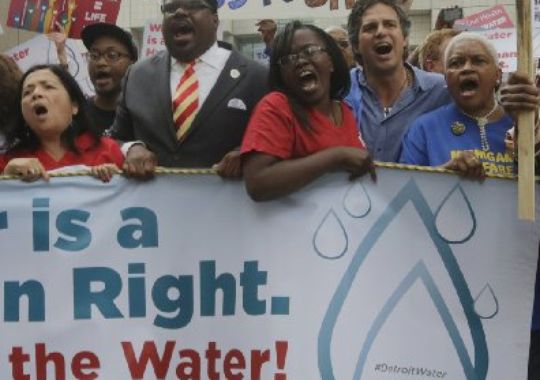 Hundreds participate in a march and rally calling for a moratorium on water shutoffs from Cobo Center to Hart Plaza in Detroit on July 18, 2014.(Photo: Kathleen Galligan/Detroit Free Press) By Nene Igietseme Reflections on the Frontlines, Part 1 of 3
It’s fitting that poetry and music began and ended the Our Power Detroit gathering. Besides the legacy of Motown, it is often only in our creative expressions that we can truly begin to articulate our wildest dreams, hopes, and aspirations. Will’s piece (dedicated to Charity Mahouna Hicks) spoke of his desire to return to unity and to one-ness with each other, our ancestors and our futures. Articulating, sharing, and reiterating these visions is crucial, particularly in Detroit right now. With the city under emergency management, it is not uncommon to hear people speak about their conditions, which mirror the hostility that exists for all poor people, people of color, and communities in the face of global capital and profit-driven enterprise. This hostility is now ever-present and undeniable in Detroit with the city under emergency management.
The Our Power Detroit conference, grounded by the East Michigan Environmental Action Council (EMEAC) and its youth program, the Young Educators Alliance (YEA), took place at the end of June. This 3-day convening brought youth and organizers from across Detroit and the country together to explore the grassroots strategies they are all using to fight the climate disruptions and economic injustices brought on by our current economic system.
Detroiters, however, have moved beyond merely articulating new visions for their city. With massive water shutoffs coming down the pipeline from the Emergency Manager, combined with rising temperature and water prices, the people of Detroit are taking action to provide water to those who can afford it the least and need it the most. With refrains like “Water is a Human Right,” “Water is Life,” and “Detroit Flows”; Detroiters led the Our Power Detroit participants to set up the first People’s Water Station to provide water to their people as well as to canvass the area to alert residents that “It’s not your fault, but it is your fight.”
 As the Movement Generation Justice and Ecology Project often reminds us, “What the hands do, the heart learns. If we put all of our labor into fighting what we don’t like, we will learn to love the fight and only have longing for our vision.”
While protests and advocacy are always important, in this instance, Detroiters also considered and executed the revolutionary act of resilience – meeting their needs by working together to provide for themselves and their community.
The music and poetry that threaded the gathering called forth visions of interconnection, self-sufficiency, community control, child-centeredness, love, and empathy. There was real joy in applying our labor to our vision through the “Water is Life” Action and setting up the People’s Water Station, and we are one step closer to our vision of community controlled, accessible water for all because of the work we put into building it.
As a whole, however, many of us are out of practice doing much of the work that we need to meet our needs – both our material needs and our psychological needs. Many of us don’t know how to farm, how to hold each other accountable in love, and many of us have forgotten how to play. There is much local communities can teach us about how to meet our needs, interdependently and collectively. The Our Power Campaign led by the Climate Justice Alliance proposes that these kinds of local solutions are crucial to ensuring that people regain control over land, water, energy, and culture – the things we need to survive. If we can practice making decisions democratically, meeting our needs collectively, distributing resources fairly, using restorative justice practice, then we can prepare ourselves to confront an ever more uncertain future with climate catastrophe looming over our communities.
As the government and private sector seek false promises to the climate crisis that fall within the current framework of profit-driven private enterprise, we must prepare ourselves to contest for power in that space for commnunity-rooted solutions that truly work for our people and the planet. Fittingly, the Dexter-Elmhurst Community Center, which serves as the site of the 1st People’s Water Station, is also home to other solutions that meet community needs such as a Children’s Free Lunch program and a Swap/Re-Sale store.
Due to the actions taken by the Water is Life coalition, Detroit Water and Sewage is out from under the control of the Detroit Emergency Manager, and back in the control of the democratically-elected mayor. The battle, however, is not over – water shutoffs are still occurring and the people of Detroit are now fighting to keep the Dexter-Elmhust People’s Water Station from being shut down as they continue the almost 10 year fight for the implementation of the Water Affordability Program so that these shutoffs NEVER have to happen again.
Fighting for the right to take care of our people and ourselves is not going to be easy. The poetry and songs from people on the frontlines of the extractive economy, however, remind us that people are doing this everyday, and more importantly, that they are excited and ready for the challenge. Our Power Detroit was an inspiring opportunity to see Detroiters demanding and building resiliency from and with each other – in their words and actions and through their culture and music. |















